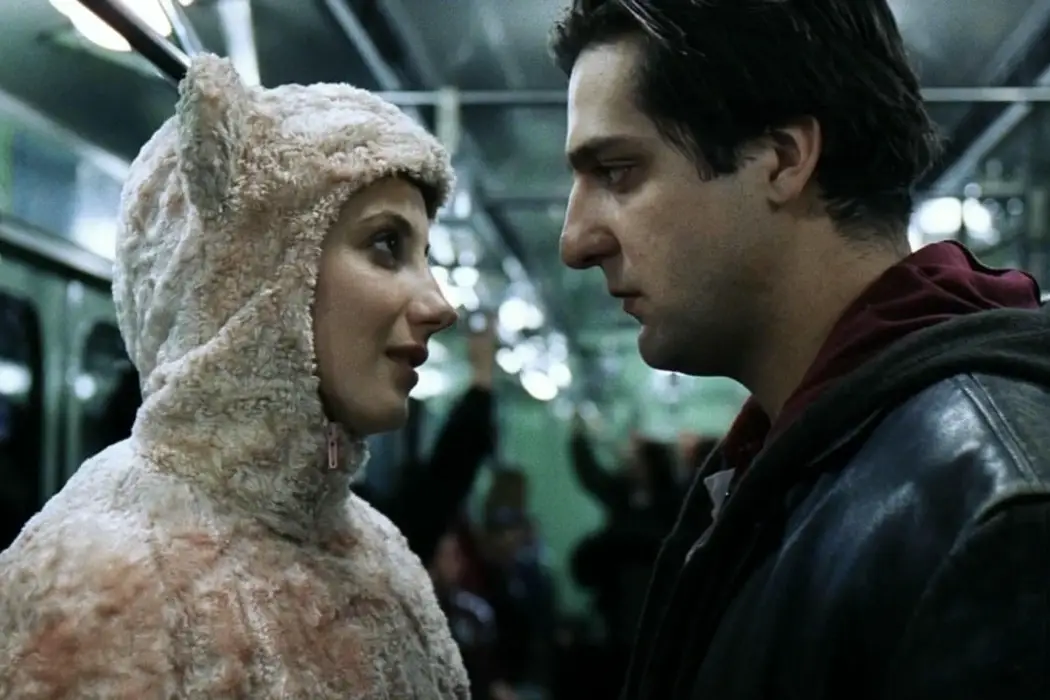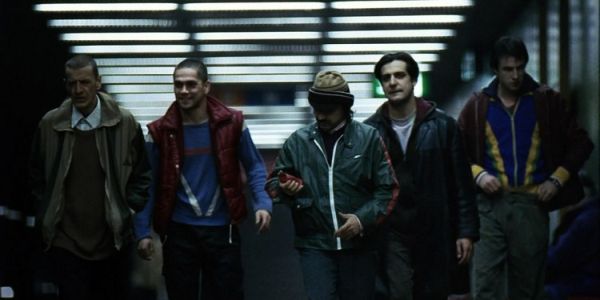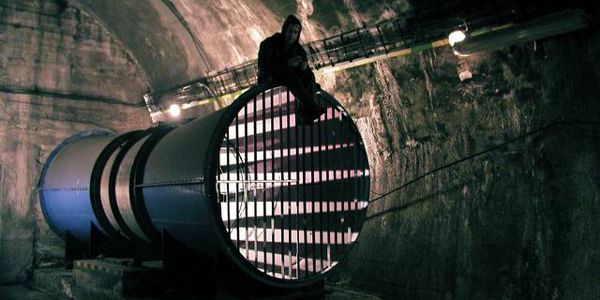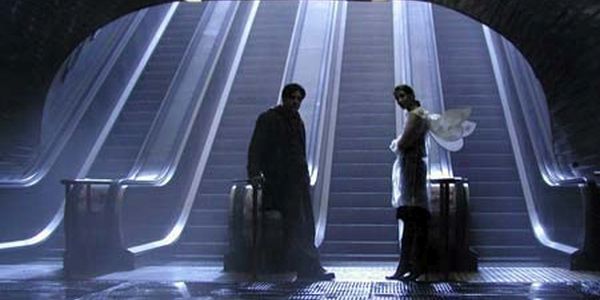Nimród Antal’s KONTROLL: The Kafkaesque Comic Nightmare Perfect For 2020

Danny Anderson teaches English at Mount Aloysius College in PA.…
“Wandering between two worlds, one dead,
The other powerless to be born,”
– Matthew Arnold, “Stanzas From the Grand Chartreuse”
The world as we have known it disintegrates before our eyes.
2016 ushered in an extended period of political upheaval and uncertainty. Then, suddenly, the COVID-19 pandemic brought death and fear, hurling the world into a massive economic recession. Then, in the midst of that chaos, the murder of George Floyd by a white police officer in Minnesota ignited incredible grassroots protests about police brutality against people of color in the United States. Many of these protests have produced more violence both from protesters and, more disturbingly, from law enforcement personnel itself. The old world is falling apart and the question of what replaces it is an anxious one.
During this time of mourning and uncertainty, I’ve been drawn to a movie that I think speaks to the anxieties of sweeping social and political change. One of the strangest and most intriguing films I’ve ever seen is Nimród Antal’s 2003 comic nightmare Kontroll and it seems strangely relevant to our moment.
Certainly one of the reasons this film appeals to me is its setting, the subway system of Budapest, Hungary. I visited the city once in 2007 and riding the subway was like stepping into another world. The very depth of the escalator into the tunnels was disorienting and I held firm to the railing as I experienced a touch of vertigo during the descent. Then riding and navigating the ancient trains, along with the strange ticketing system, was its own kind of otherworldly experience.
Kontroll captures that unsettling feeling on film and creates a space in which to explore the Kafkaesque horror of the in-between, the neither-here-nor-there. Kontroll uses the Budapest underground as a dreamscape to explore the nightmare of a life in the torrents of massive social change. The workers in this film bear the brunt of a massive cultural shift and the newly emerging, yet still unsettled (and unsettling) reality of transitions between epochs.
Plot and Political Background
The film follows the lives of a quirky group of ticket-checkers who deal with an overbearing bureaucracy, the de-humanizing disrespect of the subway’s travelers, and a demonic killer who is pushing people in front of trains.

Protagonist Bulcsú (Sándor Csányi) is the group leader of a team of inspectors who are tasked with checking tickets in the train system under Budapest. Bulcsú’s group is an under-achieving bunch and characterized by the quirks that mark them as loveable misfits. There is the angry narcoleptic, the clueless new guy, the world-weary older man resigned to his fate and the little bully with a Napoleon complex. Bulcsú himself is private and difficult to read but well-liked by nearly everyone. He represents one of the film’s main mysteries as he is the most competent character, yet chooses to sleep on the subway platform after work, thereby never leaving the underground.
The workers’ lives are perverse, yet comic, nightmares as they are forced to withstand the disrespect and wrath of subway riders. Under Hungarian communism, the subway was free. With the transition into Western capitalism, that changes, and riders are required to purchase passes and show them upon request to inspectors like Bulcsú and his men, who are subjected to their disdain.
In the midst of all this mundane drama, there exists a monster. A hooded, demonic figure has been pushing people to their deaths on the tracks.
Workers Against the World
As we will see later, the film owes a great debt to Franz Kafka, making its ultimate “meaning” enigmatic. What is clear, however, is the sympathy it has for its workers and their ordeals. The first act culminates with the crew beginning their work, and we are made to feel their anxiety as they gear up for the inevitable brutalization they know is coming.
The transition from communism to a free-market system created the need for this class of workers. Markets dictated that the trains could no longer be free. This transition into “freedom” however, was met with discord in the tunnels, however, and the inspectors bear the force of popular resistance.
In a comical, yet empathetic, sequence we see the men board the train and put their identifying arm-bands on. The bands are meant by the governing bureaucracy to convey authority, but the workers know that they only elicit scorn. From generic businessmen to tourists to pimps and their prostitutes to even cops, the inspectors are tormented by all segments of this society in transition. The sequence ends with the crew being literally beaten by a group of hooligans in a train car. Their experience in the tunnels is a nightmare inspired by the tension of living between two worlds.

The human toll this tension brings is illustrated in a powerfully tragic manner. In one of the film’s most troubling sequences, a co-worker from another crew, Laci, cracks under the stress of this life and murders an offending passenger, slitting his throat as a crowd watches in horror.
Bulcsú’s Old Life
Bulcsú himself might have been one of those tormenting passengers in some alternative reality. On the job, our protagonist encounters a co-worker from a former life and we come to find out that Bulcsú was at one time a respected and innovative professional. The nature of his work isn’t clear, but his friend hints that his work might have changed the nature of the world.
When pressed on why he abandoned his work for the underground, Bulcsú sadly admits “when for years you wake up, that you have to win every battle every day to prove that you are the best at everything, I started to worry what would happen if it turned out I wasn’t the best. I didn’t want to worry.”
Hungary had begun the transition out of communism in the 1990s, so one can imagine Bulcsú working in the newly developing capitalist economy through that decade and becoming burnt out by the rat race he found himself in. Just as the patrons of the subway expressed discontent with that newly emerged system, so too did Bulcsú become weary with his own transition in the world above the underground.
It seems then that the anxieties of societal upheavals permeate the society above the subway as well. The new system, though it accorded Bulcsú prominence and success, brought with it the demands of competing in the free market and this competition eventually drove him into his own form of Hell.
“Railing”
The metaphor of “the rat race” that Bulcsú alludes to in his description of his old life is made literal in the film’s “railing” sequences. Railing is the act of racing trains on foot between stops, a deadly but exhilarating game some inspectors play.

Bulcsú has two adversaries in the film that serve as negatives for his character. One is the Shadow (who pushes passengers in front of trains) and the other is Gonzó, the leader of the team currently favored by Management. Midway through the film, Gonzó challenges Bulcsú to a railing contest, which Bulcsú wins while saving Gonzó’s life in the process, one of the film’s most dramatically human moments.
The race is not only a competition between two men but one against a system as well. One or both men might not only lose the race but die in their attempt to win. The metaphor for the cruel competition capitalism brought with it is clear, and the sequence serves to make literal the metaphorical dilemma Bulcsú describes to his friend.
Surveillance and Kafka’s Shadow
The way in which Kontroll takes the metaphor and gives it literal form is only one way in which it nods to Franz Kafka, the German-speaking, Jewish writer from Prague. If any artist ever embodied the madness of inhabiting in-between spaces, it is Kafka, and this makes him an artist of supreme relevance to our time.
One feature of Kafka’s work is the way he too makes metaphors literal. “The Hunger Artist” does this with the trope of the starving artist, and “The Metamorphosis” does it with the way in which work dehumanizes human beings in the modern world.
Kafka’s work also resonates with other aspects of the film. The Castle, for example, is an extended exploration of dealing with faceless bureaucracy and navigating a world full of dead ends, as is The Trial. Both novels inform Bulcsú’s experience working in the Budapest underground.
Another key theme of Kafka’s work that emerges in the film is that of surveillance. The transition into modernity was for Kafka a nightmare and one of its features was the emergence of surveillance as a means of control (perhaps we might say Kontroll?). Government entities, employers, friends, and lovers all place Kafka’s protagonists under constant surveillance, forcing them to internalize the constraints society places on them. In short, they end up not only conforming to rules, they enforce them upon themselves.
Antal’s film also places surveillance at the forefront of his film’s imagery. Not only are the inspector teams monitored by layers of bureaucracy, but they are also always under the watchful eye of the underground’s camera system, which Bulcsú disdainfully stares back at (and even addresses) throughout the film.

The inhumane political control imposed by Soviet-style communism did not disappear with the rise of free markets and free elections, it merely took new forms in the Budapest underground, making the uncertainty of the upheaval all the more anxious.
Conclusion
This dreamlike, Kafkaesque film seems unusually fresh at our current moment of transitions. One thing is passing away and another is struggling to be born. At this moment we are all as paralyzed as Bulcsú sleeping on the subway platform between his beatings.
Kontroll ends with a bit of hope. Bulcsú finds his way out of the subway with the help of his “angel,” a woman he periodically meets in the underground. Unfortunately, there is no reason to believe that hope and progress is inevitable. Transitions also might bring nightmares.
Hungary’s transition from communism to Western economic and political systems was met with great optimism, but by 2003, when Kontroll was made, doubts were becoming manifest. The Shadow, who without purpose randomly murders people in the underground is a figment of something darker (and the film leaves open the possibility that Bulcsú himself might actually be the Shadow in one of Kontroll’s most Kafkaesque moves).
We like to think of free markets and democracy going hand in hand, but even in the film, the specter of fascism is tangible.
Gonzó’s crew is favored by management for their results. They are cruel and authoritarian, unlike Bulcsú’s ragtag, yet humane group. The crew is rewarded for their work by management with new prototype uniforms, black leather jackets with imposing armbands. Wearing them, the crew evokes imagery of the SS and Nazis, a look that befits their approach to their work. Here the film hints that fascism and market capitalism are more than compatible.
And what has become of Hungary since the film was made? The authoritarian Premiership of Viktor Orbán has many commentators concerned about the future of democracy, not only in Hungary but across the spectrum of formerly liberal democracies.
Kontroll seems to have been onto something, shall we say, subterranean in the uneasy transition between worlds. It should remind us to keep close watch over the politics of our own transition now.
What movies are helping you cope with 2020? Let us know in the comments below!
Does content like this matter to you?
Become a Member and support film journalism. Unlock access to all of Film Inquiry`s great articles. Join a community of like-minded readers who are passionate about cinema - get access to our private members Network, give back to independent filmmakers, and more.
Danny Anderson teaches English at Mount Aloysius College in PA. He tries to help his students experience the world through art. In his own attempts to do this, he likes to write about movies and culture, and he produces and hosts the Sectarian Review Podcast so he can talk to more folks about such things. You can find him on Twitter at. @DannyPAnderson.












